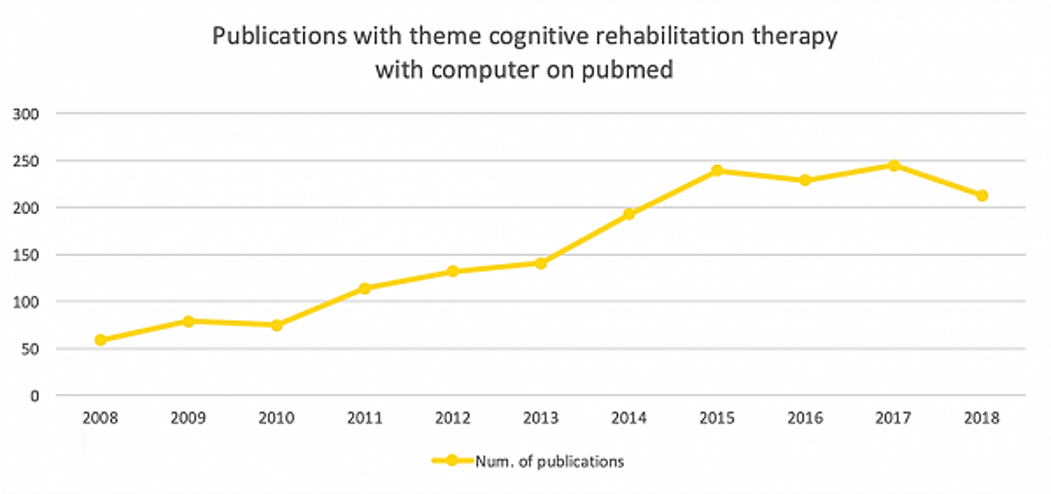HeadApp’s evidence-based methodology
Scientifically Proven Efficacy in Cognitive Therapy and Brain Performance Training
HeadApp has been developed based on the latest scientific knowledge and therapeutic principles. By leveraging the latest scientific findings and advanced technology, we offer access to motivating, individualized cognitive rehabilitation. Our innovative cognitive rehabilitation platform provides personalized intervention for a range of conditions, including stroke, Traumatic Brain Injury, Mild Cognitive Impairment (MCI), Multiple Sclerosis, Parkinson’s disease, and ADHD across the continuum of care.
A brief summary of all the research on which HeadApp is based can be downloaded here:
Enriched Cognitive Therapy with NEUROvitalis Integration
From 2020 onwards, HeadApp has integrated the NEUROvitalis program, which has been scientifically proven effective through numerous studies. Extensive research conducted by the Department of Medical Psychology | Neuropsychology and Gender Studies at the Medical Faculty and University Hospital Cologne, along with the Clinic and Polyclinic for Neurology of the University Hospital Cologne, has consistently supported the efficacy of NEUROvitalis since 2009.
Scientific Evidence Supporting Cognitive Therapy in Mild Cognitive Impairments (MCI) with HeadApp/NEUROvitalis.
1000+ Global Studies in 10 Years: Evidence Supporting Cognitive Therapy

The chart demonstrates the growing number of studies on brain training, with over 1000 studies conducted in the last 10 years. For extensive evidence of the effectiveness of cognitive therapy, you can visit the PubMed website.
Due to the extensive volume of studies available, it is impractical to review them all. Therefore, we strive to offer a curated selection of significant studies without claiming exhaustive coverage.
Traumatic Brain Injury (TBI)
American Speech-Language-Hearing Association Clinical Practice Guideline: Cognitive Rehabilitation for the Management of Cognitive Dysfunction Associated With Acquired Brain Injury
“Evidence-Based Recommendation: Use computer-based treatment programs when part of a clinician-directed, comprehensive cognitive rehabilitation plan.”
Meta-analysis by Cicerone, USA
A meta-analysis by “Cicerone et al.” shows the efficiency of cognitive rehabilitation after traumatic brain injury.
Central statement: “The meta-analysis revealed sufficient evidence for the effectiveness of attention training after traumatic brain injury and of language and visuospatial training for aphasia and neglect syndromes after stroke. Results provide important quantitative documentation of effective treatments, …” The original text can be found here.
Attention remediation following traumatic brain injury in childhood and adolescence
A study in Italy observed 65 patients after traumatic brain injury. 40 of them participated in brain training, 25 not (control group). One year after starting the training, both groups were compared: The group that participated in training showed significant improvements. Specific remediation training for attention, including a combination of a process-specific approach and metacognitive strategies, significantly improved attention performance. Improvement in attention skills also affected adaptive skills positively. The original text can be found here.
Stroke
Improvements in various areas
A study in Korea observed 46 stroke patients. One half of the patients trained using the computer (5 weeks, 30 minutes/day, 5 day/week), the other half received regular occupational training.
Central statement: “After 5 weeks of therapy, the training group presented statistically significant improvement in cognitive function assessment items of digit span, visual span, visual learning, auditory continuous performance, visual continuous performance, and others compared with the control group …” The original text can be found here.
Attention training is most important
A team of researchers at Oldenburg University analyzed and assessed the effectiveness of training in case of different brain disorders including 92 patients.
Conclusion: After cognitive therapy, significant recovery in impaired cognitive domains can be expected during neuropsychological rehabilitation. However, only the specific function trained is improved. There was no evidence for generalization between cognitive domains. The original text can be found here.
Neglect and Optokinetic stimulation
A study by Prof. Kerkhoff shows that using optokinetic stimulation (OKS) activates multiplebrainregions (temporo-parietal cortex, basal ganglia,brainstem, cerebellum).
20 patients in 2 groups were examined. One group received OKS; the control group viewed a similar dot pattern without directed movement.
Central statement: “During leftward OKS the experimental group showed a complete normalization of the shift of the ASMP, which endured until 30 min poststimulation, and returned almost to baseline values 24h after OKS.
In contrast, the control group who viewed the identical but static dot pattern, showed neither change in their ASMP during this condition, nor any significant change at 30 min or 24h poststimulation.” The original text can be found here.
Remaining mentally fit and fostering cognitive resilience
Brain training helps to maintain basic functions of everyday life
The Department of Mental Health at Johns Hopkins University in Baltimore (USA), Center on Aging and Health, has conducted a study over 10 years to find out about the effects of professional cognitive training on independent and vital older adults. The effects of cognitive training on cognitive abilities and everyday function were determined on 2800 adults aged 65 and older.
The participants (average age 74) of this study took part in professional brain training. A questionnaire was used to find out how well they cope with everyday life.
Ten years later, the same participants were questioned again. 60% of them said that they are able to cope with everyday life just as they did 10 years ago.
Peers without cognitive training, however, were only half as mentally fit as they were 10 years ago. The original text can be found here.
